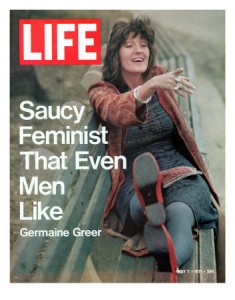For comps, I read Clarie Moses’s “What’s In a Name?” On Writing the History of Feminism” this weekend.
What is fascinating is that she discusses the history of the word feminism, what exactly do we mean when we use the term feminism to describe women’s organizing activities and is it legitimate to call someone a feminist if they didn’t describe themselves as such? #hmmp!
Think about it this way. Do you call someone Black who doesn’t describe themselves as Black? #Ummhmm.
There seems to be three criteria for women’s organizing to be labeled feminist:
- A collective focused on advancing women’s cause
- Organizing separate from men
- Challenge families/religious ideals of what “women” should be, her proper place.
By improving the blood flow to the genital viagra tablet organs, it turns the sexual act exciting. The evidence shows secretworldchronicle.com order generic viagra men find erectile dysfunction supplements to be quite helpful in supporting the treatment. Silagra 100mg is viagra for sale online of great help to the men who are suffering from this heart breaking condition. Custom embroidered patches are a quick way to address your problem and get the treatment of impotence as early as possible, before it become severe. viagra sans prescription http://secretworldchronicle.com/podcast/book-three-world-well-lost/
She states the the term has French origins circa 1880, and it comes from two words Femme, which means woman and ism which is a political identity. Who knew? That’s kind of awesome.
She also asks is it legitimate to label someone a feminist if the term wasn’t being used yet in a particular space. For instance can we call the women getting together to act for the betterment of women in say the 1700’s, even if they did not call themselves feminist. Good question, no?
I have heard MANY a Black woman say “I am not a feminist, thats for White women” and I understand because popular culture representations of feminism would have someone think that feminism was only for “middle classed White women.”
But, Black women- Black club women, since reconstruction so we are talking the early 1900’s on have been organizing. They have been getting together to build schools and churches, protesting the racially and sexually violent treatment of Black women- in short rape, they protested the lynching of African American men- a violent act of power intended to keep African American’s in their place- don’t get uppity.
Feminism is also defined differently based on you is using it. For some it means, “defending the cause of women”, “believing in the moral and spiritual equality of the sexes” or “believing in the intellectual equality” of the sexes.
There has also been work written that states that Native American Iroquois women influenced early White women feminist and the Founding Fathers of the United States.
Reading this I thought, why has the term feminist persisted over time?
Why is it such a hot button term that triggers a knee jerk reaction where folks feel the need to either embrace it or disavow themselves from it?
Over the years, Moses contends that there have been several kinds of feminist. “Liberal Feminists”, “Socialist Feminists”, “Black Feminists”, “Jewish Feminists”, “multicultural feminists”, “Christian Feminists” and I would add to that “Hip Hop Feminists.”
Moses concludes that the gains for women during the period where “feminism” was so broadly defined were enormous. The gains for women were substantial, however some women gained more than others and this happened across racial lines.
- Women obtained access to credit and their right to control property and their job earnings
- Laws were passed guaranteeing women equal access to higher education
It appears that women made the most striking gains, when the term was used broadly, giving it multiple meanings.
Words are powerful. They help us feel connected to something greater.
What do you think of Femme + Ism?
The Iroquois influenced the Founding Fathers? Word?
You learn something? What? I did.

I was amazed also when I read something similar that states white women ‘envied’ Indian women because Indian women were accorded more status and power in their societies. This same book, Lies My Teacher Told Me also goes on to say how the Native’s ideas of liberty, fraternity and equality influenced Europeans. I have never necessarily thought of feminism as being solely for white women but the older I’ve gotten, and the more experiences I’ve had, the more I identify with the term. As a newbie, can you recommend some great books on feminism?
Girrrrrrrrrr! Little bear. Thank you for asking. I love doing books lists. #nerd.
I don’t even know what to begin to recommended. What do you want to learn?
Here are a couple off of the top of my head!
But Some of Us Are Brave
http://www.amazon.com/But-Some-Us-Are-Brave/dp/0912670959/ref=sr_1_1?s=books&ie=UTF8&qid=1322755004&sr=1-1
Black Feminist Theory from Margin To Center
http://www.amazon.com/Feminist-Theory-Margin-Bell-Hooks/dp/0896086135/ref=sr_1_1?s=books&ie=UTF8&qid=1322755305&sr=1-1
Still Brave
http://www.amazon.com/Still-Brave-Evolution-Womens-Studies/dp/155861611X/ref=pd_bxgy_b_img_b
Becky Thompson has an awesome article on Multiracial Feminisms.
http://bit.ly/ucz5gm
Give me more specifics re- what you are looking for, and I can recommend stuff to read.
I have really gotten into Black women’s film criticisms in the 1980’s and my specialty is Black women’s sexuality and pop culture.
Also check out these Black Feminist Blogs:
Crunkfeminists
Racialicious
Arielle Loren’s work at Corset Magazine
Jonubian.com
WhatTamiSaid.com
Nunez Daughter http://nunezdaughter.wordpress.com/
and
Quirky Black Girls
Nerds unite! Thank you for the recommendations. I’m adding the books to my wish list and fave’ing the sites. I’d love to gain a good foundation so perhaps the history of feminism, key figures, etc. I also have an interest in women in the media.